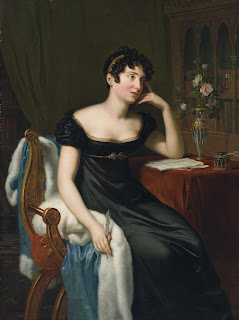Sydney Morgan and the Craven Connection
Sydney, Lady Morgan, is a Regency period novelist whose name makes her sound far grander than she was. She was born Sydney Owenson, daughter of an actor in Dublin, and started writing novels about Ireland that were an immediate success. Her best known is entitled The Wild Irish Girl.
Her books were met with enthusiasm by many readers as well as damning reviews from some critics. She became a paid companion to Lady Abercorn, who persuaded her to marry Thomas Charles Morgan, the Abercorn family physician; he later got knighted as a result of the Abercorns pulling strings. So Sydney became Lady Morgan and as such was received in London high society. She went on to write many more novels and books about France and Italy where she travelled widely. Her very Liberal and allegedly republican views got her banned from Tuscany by the Austrian rulers, but only after she had visited it and described it in detail.
Morgan was a great admirer of Elizabeth Craven, whose books, principally the travelogue, she said were the first books apart from school books that she had ever read, and she remembered them vividly. When she met Craven's son in Paris, she angled for an invitation to be introduced to his mother.
It is to be questioned whether it was Berkeley she met or his brother Keppel, who was the one who was living with his mother, and had a close friendship with Sir William Gell. Perhaps she muddled their names up.
At any rate, when she did get to Naples shortly afterwards, in 1820, Berkeley or Keppel kept his word and introduced her to the author she so admired. In fact she had the good fortune to be invited to the Margravine's private theatricals, at her villa in Posillippo. Sadly she does not seem to have written her own account of the occasion.
This is how the Scottish theatre enthusiast, John Waldie, recorded the evening:
"Mr. Mathias called for me at near 8, and I went with him to the Margravine of Anspach's, where there was a crowd. Sir W. A'court, Sir Charles* and Lady Morgan, Prince Pettinaro, Prince Yablanowski (Jablonowski), and the Prince and Princess of Denmark, always easy and pleasant. The Margravine did the honors well. There were 2 pieces acted in a room very elegantly fitted up as a Theatre. There was a room with refreshments between the pieces and after the last. The first piece, La Somnambule, was very pretty and well done. The Sleepwalking Lady by Madame D'Ascalon, the Lover by Prince Torella, the Officer she is contracted to by Keppel Craven, the Father by Marchese Salvo, and the Servant of Frederick the Officer by Conte Giraci (Nicola Serra was son of Princess Gerace, and his title was Count of Monte St. Angelo), and the femme de chambre by the Principessa Torella. They were all good. The next piece was Les Ricochets by the same actors, except that Madame Acton, the sister of Madame D'Ascalon, did the young Lady and was most lively and full of talent -- they are two French sisters, one is wife of General Acton here and a very fascinating, tho' not handsome, woman. Keppel Craven as the Valet and Giraci as his lackey were good, and the Principessa Torella as the femme de chambre was excellent, but the Prince Torella as the Colonel and Madame Acton were both capital. Very much more amused than I expected. I walked home with Mr Mathias." [From the Journal of John Waldie, Naples 16th March 1820:]
Curiously enough, Waldie does not say whether these plays were acted in English or in French. La Somnambule had been translated by Craven as The Sleepwalker many years earlier.
It was quite a distinguished company. Sir William d'Acourt was the British Consul in Naples and Prince Jabłonowski was the Polish Ambassador. General Acton, from an old Jacobite Catholic family, had been commander of the armed forces of Naples in the 1790s. It would be very interesting to know what Lady Morgan and Elizabeth Craven, two female novelists and bold spirits, said to each other and what they thought of each other. As an actor's daughter, it is a pity she did not take part.
Morgan: Passages from my Autobiography [New York: Appleton and Co, 1859]
*THOMAS CHARLES MORGAN , M.D. , was the eldest son of John Morgan, esq., of Charlotte-street , Bloomsbury ... physician. The Roll of the Royal College of Physicians of London: William Munk, 1878.
...




Comments
Post a Comment